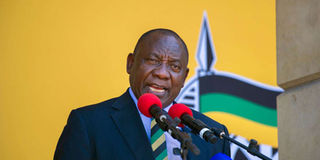Premium
As Ramaphosa tackles Covid-19 graft claims, rot within ANC takes root

South African President Cyril Ramaphosa. Photo | File | Afp
What you need to know:
- Members of ANC are alleged to have been involved in selective distribution of government-supplied food relief parcels or in emergency response procurement tender irregularities.
- Some high-ranking members of the ruling party and government officials are alleged to be among those under investigation.
- The party said it was drawing the line on corruption and would combine preventative and punitive measures to halt it.
South African President Cyril Ramaphosa is under mounting pressure to do more than say that he is against corruption amid numerous claims that food, monies and procurement processes earmarked for the fight against Covid-19 have been heavily abused.
In addressing the nation after his own spokesperson had to step aside amid allegations that her husband had been favoured in the supply of Personal Protective Equipment (PPE), Mr Ramaphosa said there would be “no tolerance” for corruption at a time of crisis.
He announced that he had formed a nine-agency taskforce, headed by a dedicated specialised investigative unit, to root out and punish Covid response-related corruption.
The unit’s job is investigate and prosecute any and all misspending, misappropriating of public money, tender irregularities or any other corrupt activities.
He was speaking as South Africa crosses the half a million infections mark, with at least 8,500 dead plus several thousand additional ‘suspected’ Covid deaths.
The sudden focus on corruption was not only due to the issue coming close to home through his spokesperson’s tangential exposure on the issue – there have been literally thousands of reports from around the country by outraged ordinary citizens.
South Africa’s Public Protector’s office has received at least 450 of those complaints formally, while social media is abuzz with numerous others.
Many members involved
In many cases, members of Mr Ramaphosa’s ruling African National Congress (ANC) – which controls national government and eight out of nine provinces – are alleged to have been involved in selective distribution of government-supplied food relief parcels or in emergency response procurement tender irregularities.
Public Protector Busisiwe Mkhwebane said that the “lion’s share of the grievances” relating to the pandemic concern service delivery failures, such as social welfare payments being denied.
However, the anti-corruption watchdog is also investigating “alleged maladministration and irregularities” for tenders awarded for a quarantine camp and the purchase of PPE.
Some high-ranking members of the ruling party and government officials are alleged to be among those under investigation.
Ms Mkhwebane said changes to normal procurement practices during the pandemic were not “an open season to pillage”, adding that the she was also looking at unspecified “other matters”.
After an intense and extended four-day national executive meeting of Ramaphosa’s fellow ANC leaders, the ruling party said late yesterday that it was “outraged” and “ashamed” by the many complaints of Covid-19 corruption.
The party said it was drawing the line on corruption and would combine preventative and punitive measures to halt it.
The ANC vowed, as it has done before, to “fight the scourge” of corruption, which has become widely associated with the party and its members.
Beyond the public statement, however, it is already well known that efforts to seriously discuss the damaging problem quickly degenerated, behind closed doors during this past weekend’s NEC meeting of the party, into a “finger-pointing exercise”, as one participant put it.
Different factions are blaming each other for benefiting from graft. In public though, the party is determined to show a united face on the politically toxic issue.
ANC secretary general Ace Magashule, who has his own corruption skeletons, said the reports of anti-Covid corruption “cause us collectively to dip our heads in shame and to humble ourselves before the people”.
“We acknowledge the justifiable public outrage caused by the depravity and heartlessness displayed by some elements in government, our organisation and the private sector,” admitted Magashule.
The media is reporting that the secretary-general’s sons have also been accused of benefiting from Covid-19 tenders, joining a long list of family members, friends and associates linked to ANC leaders who have been awarded contracts from the state during the crisis.
The furore around Covid-19 response corruption comes as South Africa slips ever farther in global good governance indices.
Rating
Transparency International’s latest rating (2018) put South Africa in 73rd place, out of around 180 countries globally, on its corruption index.
By analysis of its deterioration from around 61st position in the time of former President Thabo Mbeki, from 2000 to 2007, it was the nine years of former President Jacob Zuma’s kleptocratic administration that are largely responsible for the slide and accompanying loss of international confidence in the country.
The Bureau for Economic Research estimates that while in the 2010-2018 period the world grew on average at 3.8 percent annually, South Africa managed only 2 percent annual growth – a loss to the fiscus of over $20 billion per annum.
Even before the latest outcry, South Africans were already exasperated by corruption, which has not disappeared with Mr Zuma’s fall from power.
Said one source close to this past weekend’s “discussions” within the ruling party: “Everyone wants to blame someone else. But the truth is we all know what is going on, at least in part. Corruption has become part of the party culture and trying to root it out is going to be very, very tough, if it is possible at all.”





